#image metaphors
Explore tagged Tumblr posts
Text
Mastering the Art of Creating the Perfect and Popular Image Hack
Introduction:In today’s digital age, visuals are everything. They capture attention, convey messages quickly, and are easily shared. But not all images are created equal. The ones that go viral or become widely popular are often the result of a carefully crafted process known as an image hack. In this guide, we’ll explore how to create the perfect and popular image hack that not only stands out…
#A/B testing#Adobe Photoshop#Audience analysis#Color theory#Copyright#design creativity#design inspiration#design software#emotional appeal#engagement strategies#ethical design#High-resolution images#image clarity#image composition#image editing#image metaphors#Image overlays#image usage rights#Memes#message clarity#performance metrics#platform-specific design#shareable content#social media analytics#social media challenges#Social media optimization#social media trends#special effects#stock photos#target demographic
0 notes
Text
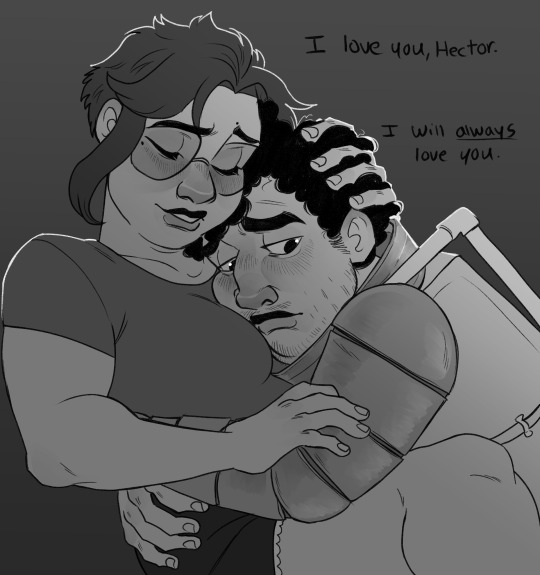
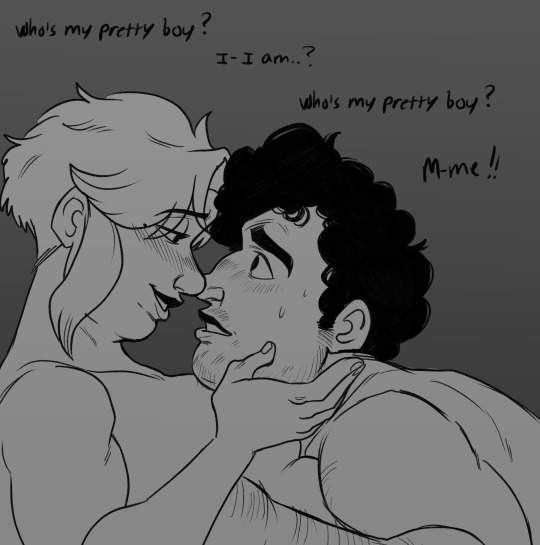
And I'm feeling tender in this chili's tonight, folks!!! 😭😭😭😭
Taglist♡: @me-myself-and-my-fos @flowering-darkness @sunstar-of-the-north @changeling-selfship @cherry-bomb-ships @rosieaurora @tropgothships @little-miss-selfships @starlos-soulmate @limey-self-inserts @candyheartedchy @space-sweetheart @clancykisser @squips-ship @berryshipbasket @soulnottainted @saturdaymorningcartoonz @severants @tex-treasures @sparkyscissorhands @iwishihadfangs @fictodreamer @adoredbyalatus @heartribbons @wizard-ships
#artfarts#self insert#self ship#self insert art#self ship art#self insert x canon#date everything#hector date everything#hector valentino airnesto condicionado#💨 loving you is a breeze 💨#suggestive#i suppose?? for the second image#i was GONNA draw clothes on them! honest!#but idk it kinda didnt feel right bcs i see it as an incredibly intimate moment for them 😭💖😭💖😭💖😭#think of it as like. metaphor for both the physical and emotional closeness 🫶#although its no secret im freaky as hell for him 😂😂😂#I CANT HELP IT!! HE INSPIRES ME#anyway BWAH HOLDS HIM CLOSE AND MAKES HIM FEEL LOVED AND SEEN AND CARED FOR 😭😭😭😭
1K notes
·
View notes
Text

Just who are you, Councilor Medarda?
#i did not like her s2 arc so i am copium and living in s1 painter mel#mel medarda#arcane#my art#i have a LOT of thoughts on her and i wish she remained like. a normal person and not...whatever the magical stuff happened#it didnt develop smoothly enough for me to feel invested and left me just kind of. confused.#& i think that forgetting about Mels painting is leaving a huge interesting level to her character because art as a whole#can be used as a metaphor for the image for others to perceive vs how we perceive it ourselves...so for mel it would be herself#with the others perception being all of piltover. her mother. jayce. vik. lest. they all see her differently and mel herself i think#presents a different woman than what she is inside in favour of being 'diplomatic' and 'moving forward'#anyway thats just me rambling i jsut think there was a lot of melon left to thump in terms of her character#i loathe her trading in her signature colours for her mothers in the end
2K notes
·
View notes
Text
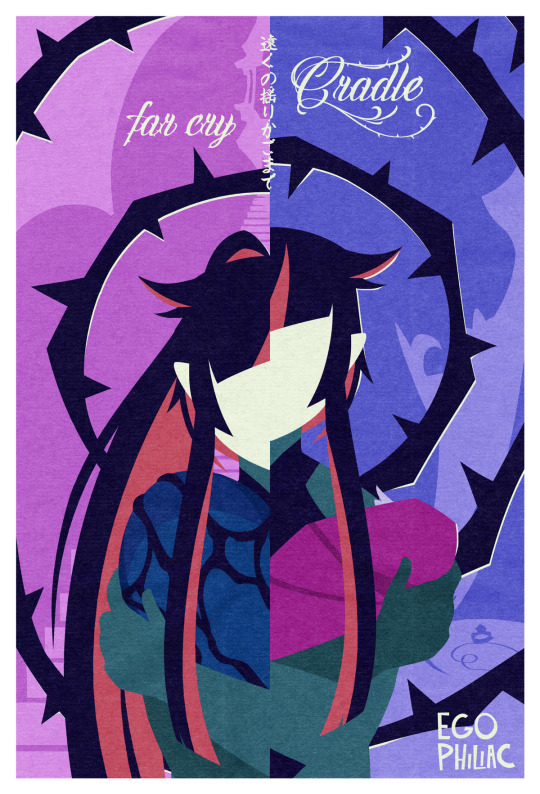
I've had a beast of a cold for the last few days, but I wanted to get this out before the new year! while I've sort of made my peace with my first take on Lilia's UM poster, I really wanted to do a version with the new context that chapter 6 gave us. because. c'mon.
(don't worry, Lilia can carry ALL HIS KIDS AT ONCE)
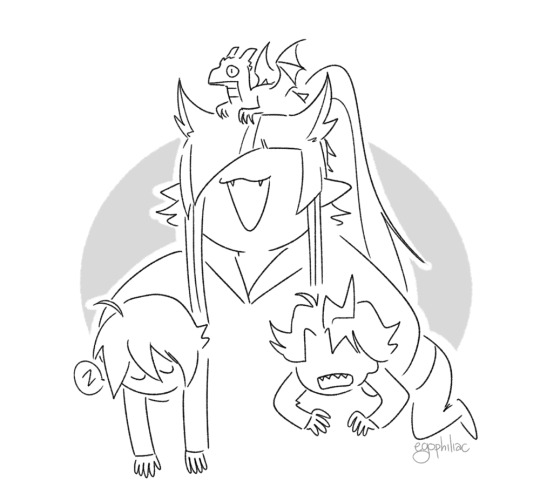
#art#twisted wonderland#unique magic posters#twisted wonderland spoilers#twisted wonderland episode 7 part 6 spoilers#twisted wonderland book 7 spoilers#twisted wonderland book 7 part 6 spoilers#the dragon cradle does make me laugh#no look i understand it's a ~visual metaphor~ for malleus' isolation#(and also lets lilia run up a bunch of steps all dramatically later)#but the image of this enormous ten-story cradle with the teeny tiny little egg in the middle of it is pretty hilarious#the draconias are SO extra about everything#now if you'll excuse me i have to go fall over for what remains of the year#happy 2024!#(i apologize to the poor person who asked a cute question about meleanor and got a giant cold medicine-induced essay in response :')#(i have been incapable of coherent thought for...a while now)
6K notes
·
View notes
Text

Supplicant
#all saints street#lynnick#lynn angel#nick hoult#art#fan art#rubber tree sap?#REALLY???#talk about an in-your-face metaphor LOL#ngl I was so proud of that though#like#no kidding I was all OMG I'M SO CLEVER about it hehehe#Oh yeah#this was inspired by that one image floating around twitter#if you know you know#teehee
329 notes
·
View notes
Text

Author and reader
#the client who commissioned me for this is actually a genius#i never thought of putting these two in the same image but I am a changed man#my art#metaphor refantazio#metaphor spoilers#(just in case)#more metaphor refantazio#louis guiabern#fanart
273 notes
·
View notes
Text
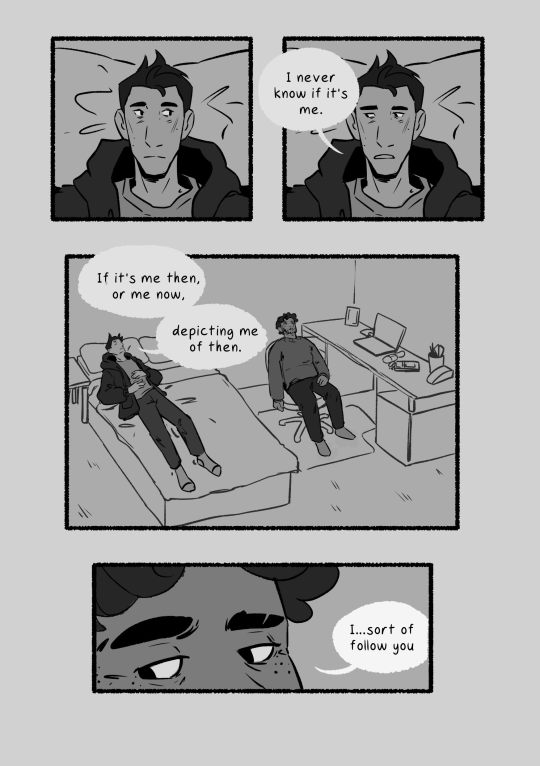
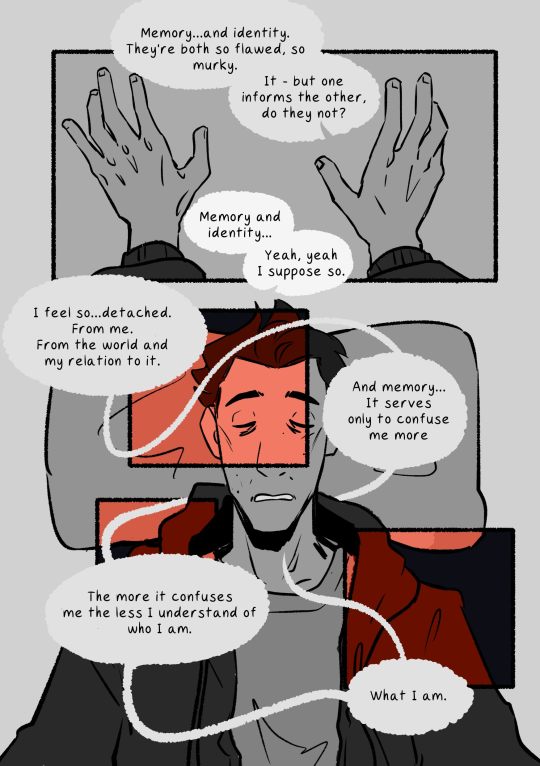
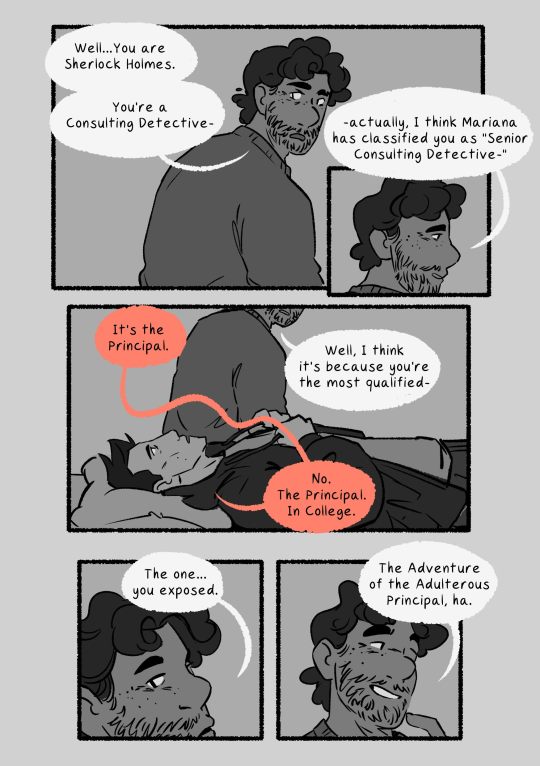
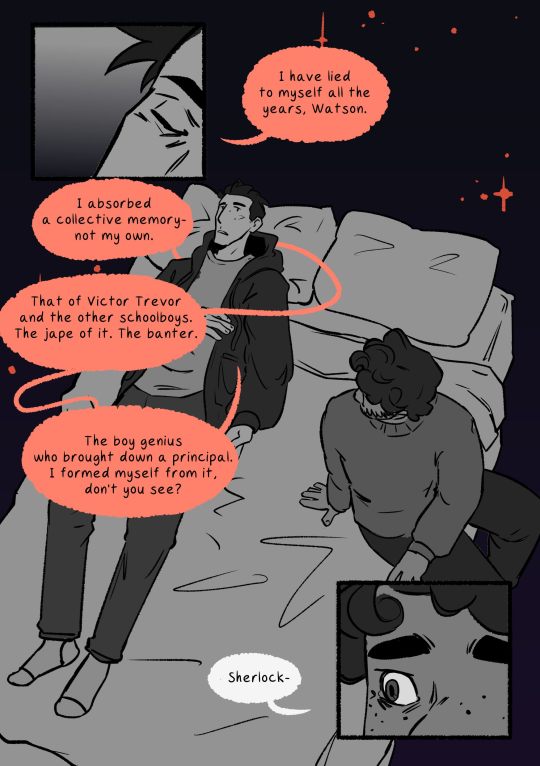
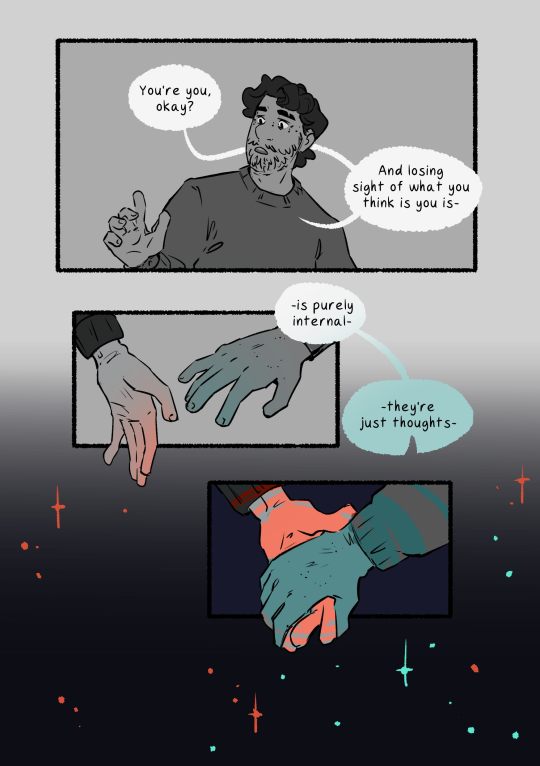
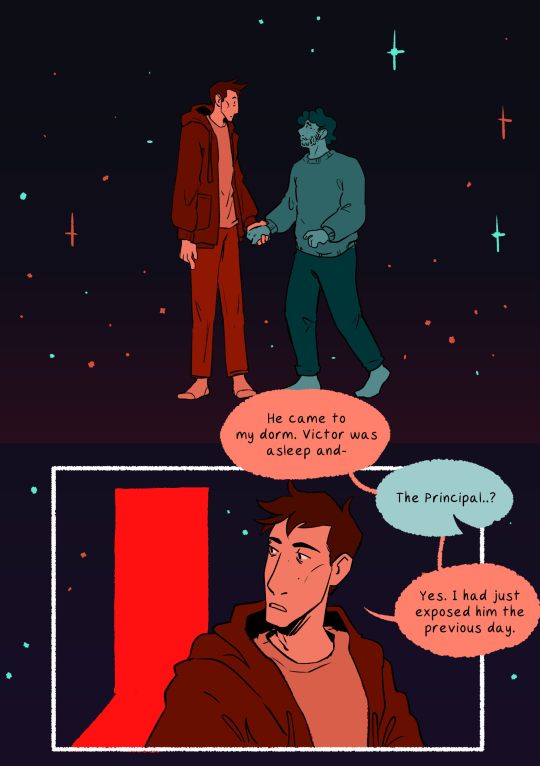
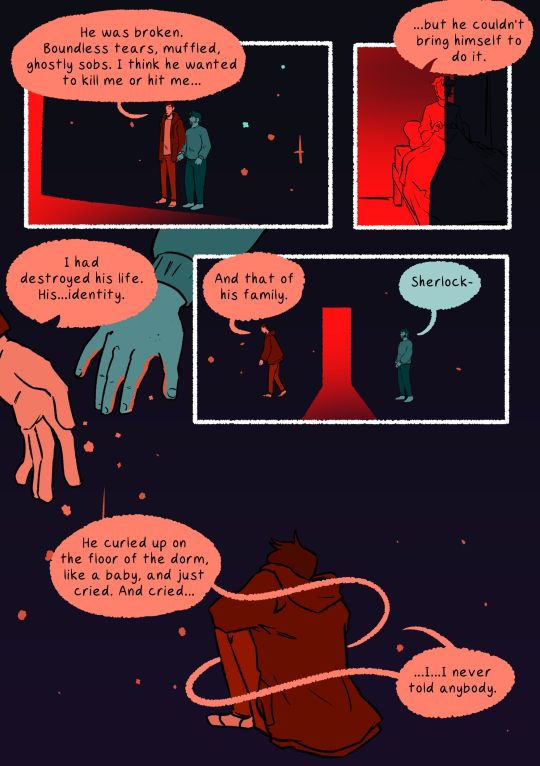
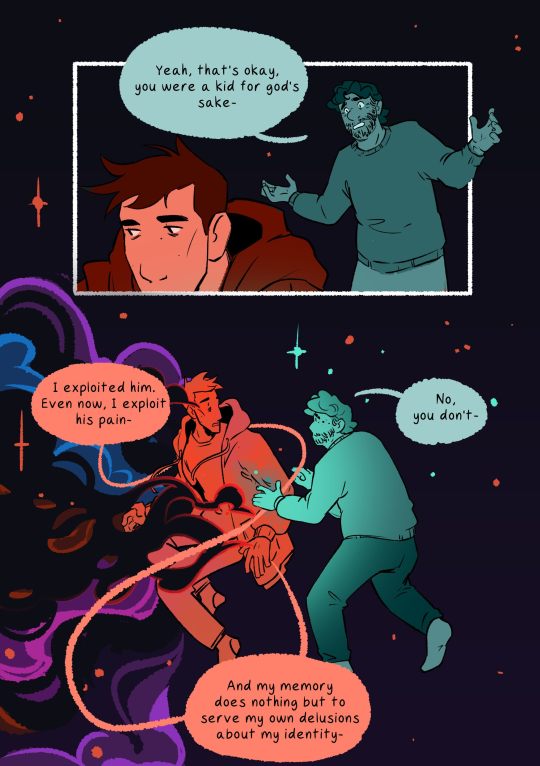
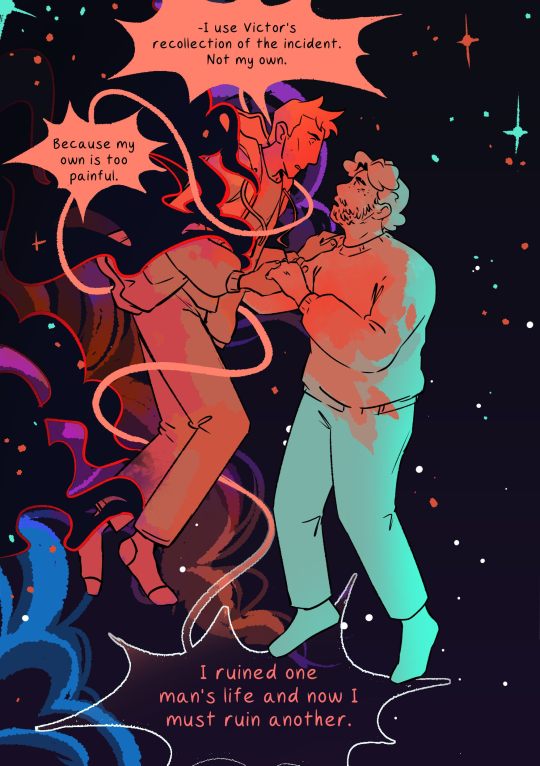
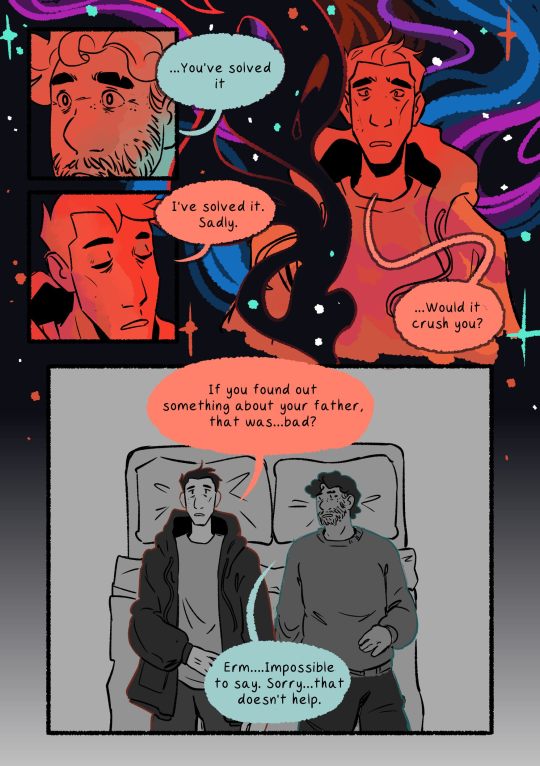
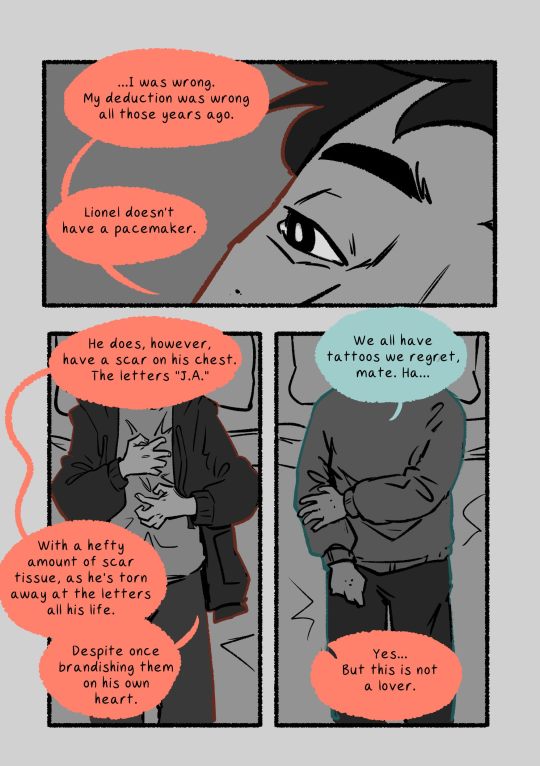
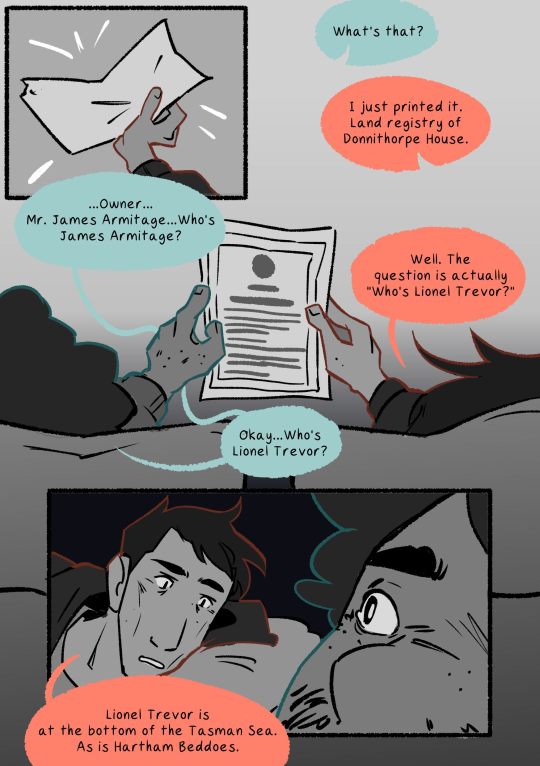
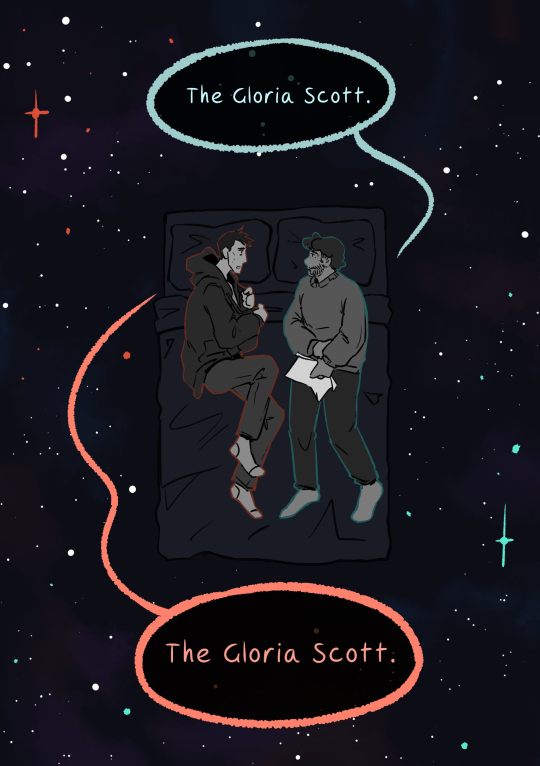
THE GLORIA SCOTT - part 2, and a follow up to my comic for the first half of this scene! thanks sm to @crashingmeteorz for allowing me to source validation for my whimsical cosmic approach to this moment <3
#sherlock & co#sherlock and co#i had such a distinct and vivid image for this scene in my mind when i first considered drawing it#but i was worried people might find it. too weird?? but . i dont want to draw 13 pages of two men lying on a bed#so heres my heavy visual metaphor for the ways in which i think john and sherlock are trying to connect with each other in this scene#i hope it makes sense!#i have so many feelings about this scene i cant put it into words so it had to be a comic instead#another note i was already working on this when joff's floorplan released and i didnt want to reshuffle the entire composition to conform#wouldnt have worked#but future comics will take the canon floorplan into account#uhmm#oh yeah also wanted to mention: i took inspiration from Space Boy the webcomic. so. read that if u vibe with this kind of storytelling#another thing: sleep well by electric president - tracks 4 5 and 6#patsart
1K notes
·
View notes
Text
I feel like I've had the same experience several times now: someone does a new translation of a non-English literary classic, and all the critics praise it to the moon, so I go and try to read it, and it's turns out it's just . . . bad? Like, really bad? And weirdly bad?
A while back, I wrote about the case of Pevear and Volokhonsky. Here's another example, which I encountered while doing background research for my novel Almost Nowhere.
----
One of my novel's major characters is a literary translator, famous for his rendition of the Persian epic poem Shahnameh ("Book of Kings").
To help me write this character, I tried to read the Shahnameh myself. I started out – where else? – with the translation that seemed to be the gold standard, and which was certainly the most critically lauded.
Namely, the 2006 translation by Dick Davis, in prose with occasional shifts into verse.
Here's how the Shahnameh begins, in Davis' translation:
What does the Persian poet say about the first man to seek the crown of world sovereignty? No one has any knowledge of those first days, unless he has heard tales passed down from father to son. This is what those tales tell: The first man to be king, and to establish the ceremonies associated with the crown and throne, was Kayumars. When he became lord of the world, he lived first in the mountains, where he established his throne, and he and his people dressed in leopard skins. It was he who first taught men about the preparation of food and clothing, which were new in the world at that time. Seated on his throne, as splendid as the sun, he reigned for thirty years. He was like a tall cypress tree topped by the full moon, and the royal farr shone from him. All the animals of the world, wild and tame alike, reverently paid homage to him, bowing down before his throne, and their obedience increased his glory and good fortune.
And here is the same opening, in the 1905 translation by Arthur and Edmond Warner (which I only discovered much later in the process of writing Almost Nowhere):
What saith the rustic bard? Who first designed To gain the crown of power among mankind? Who placed the diadem upon his brow? The record of those days hath perished now Unless one, having borne in memory Tales told by sire to son, declare to thee Who was the first to use the royal style And stood the head of all the mighty file. He who compiled the ancient legendary, And tales of paladins, saith Gaiúmart Invented crown and throne, and was a Sháh. This order, Grace, and lustre came to earth When Sol was dominant in Aries And shone so brightly that the world grew young. Its lord was Gaiúmart, who dwelt at first Upon a mountain; thence his throne and fortune Rose. He and all his troop wore leopard-skins, And under him the arts of life began, For food and dress were in their infancy. He reigned o'er all the earth for thirty years, In goodness like a sun upon the throne, And as a full moon o'er a lofty cypress So shone he from the seat of king of kings. The cattle and the divers beasts of prey Grew tame before him; men stood not erect Before his throne but bent, as though in prayer, Awed by the splendour of his high estate, And thence received their Faith.
Now, I can't speak at all about the source text. I have no idea how faithful or unfaithful these two translations are, and in what ways, in which places.
Still, though. I mean like, come on.
This is an epic poem about ancient kings and larger-than-life heroes.
This is a national epic, half myth and half history, narrating the proud folkloric lineage claimed by a real-world empire.
There is a way that such things are supposed to sound, in English. And it sure as hell isn't this:
What does the Persian poet say about the first man to seek the crown of world sovereignty?
Excuse me? That's your opening line? I thought I was reading a poem, here, not taking a fucking AP World Literature exam!
----
Postscript
Some of the critical praise for the Davis translation, quoted on the back cover of my copy (emphasis mine):
"A poet himself, Davis brings to his translation a nuanced awareness of Ferdowsi's subtle rhythms and cadences. His "Shahnameh" is rendered in an exquisite blend of poetry and prose, with none of the antiquated flourishes that so often mar translations of epic poetry." (Reza Aslan, The New York Times Book Review) "Thanks to Davis's magnificent translation, Ferdowsi and the Shahnameh live again in English.” (Michael Dirda, Washington Post) "A magnificent accomplishment . . . [Davis’s translation] is not only the fullest representation of Ferdowsi’s masterpiece in English but the best." (The New York Sun)
#almost nowhere#litcrit#fyi: the warner and warner translation is out of print now but archive.org has the whole 9-volume thing#hmm i wonder which version of the cypress/moon image is more faithful...#(in davis he's the tree. in warner&warner he's the moon. these are not the same metaphor!)
485 notes
·
View notes
Text
Esperanto in Metaphor: ReFantazio
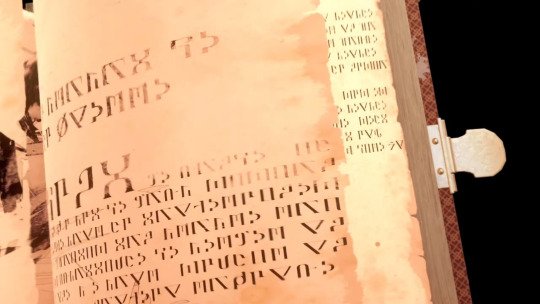
Not long ago I saw this this tweet pointing out that the in-game language in Metaphor is Esperanto (written in another script) and I decided to investigate for myself! The vocal tracks are in Esperanto as well, but I want to focus on the text here since I don't have a great ear for it. (The quoted tweet also points out that you can rearrange the title to get an Esperanto phrase - I think it would be more accurately spelled "Metafore Fantazio," or "metaphorically fantasy"!)
For the unfamiliar, Esperanto is the world's most widely spoken constructed language, developed in the late 19th century with the aim of being an easy to learn secondary language that could act as a bridge between speakers of other languages. While its vocabulary and grammar are largely derived from various European language families, it has speakers worldwide, including a sizeable number in Japan. Given the relationship between Metaphor's world and our own, I think it's a cool choice to take a constructed secondary language and make it the in-universe primary language—not to mention the game's themes of uniting different people with a language intended to do just that.
I studied Esperanto myself for some time 9 years ago, though I've forgotten most of it, so I'm very rusty. That said, I was able to sit down and parse one particular block of text that the game provides a translation for, and use that to read the rest! I'm slowly combing through the demo and translating any legible text, and I wanted to share some of the interesting details I found. If any Esperantists see this and want to weigh in, please do! There's plenty I may not remember or be aware of.
Continued under the cut, including content from the demo:

Let's start with the text the game translates for us! Here's what the VO/subtitles say:
O Great Seeker, bearer of fantasy empowered... Hear my wish, and come forth from thy epoch of glory to grant me thy guidance.
Here's the "deciphered" Esperanto:
Ho, granda serĉanto, kiu vivas en epoko de gloro, kiu enkarnigas la povon de fantazio. Bonvolu disdoni al li vian gvidadon.
And here's a more "direct" translation:
O Great Seeker, who lives in an epoch of glory, who embodies the power of fantasy. Please grant him thy guidance.
Not too much different of note here other than the pronoun usage—in Esperanto, the speaker explicitly uses "he," likely referring to the protagonist. I suspect that the English is actually translated from the Japanese line, which is ambiguous, so they made an educated guess here. But, since this is the same speaker who narrates awakening cutscenes and new bonds, it makes sense that they're calling to the Seeker on his behalf!
This is a point I'm unsure about, but from my understanding, "granda" (here translated as "great") typically refers to size, so it seems like an odd word choice to me—but it's possible there are connotations I'm not aware of.
After some poking around I stumbled across some text on the background of the name entry screen that reads "signaro" (character set), followed by the whole Latin alphabet on the next line.

"But Batts!" you may say. "Esperanto doesn't use QWXY! What about the diacritics!"
Well. There aren't any! There are 6 characters with diacritic marks used in Esperanto (ĉ, ĝ, ĥ, ĵ, ŝ, and ŭ), and since our character set doesn't use any of them, we have to make some educated guesses about which one it is at any given time. This is mostly a non-issue since they're real, existing words, but it does make it a bit trickier at points, and relates to another problem I'll get to in a bit. (There are a select few instances where I've seen diacritic marks on handwritten text or shop names, but there are still far fewer than there should be.)
That said, there is also some plain English text using this script as well, so the game does make use of those extra letters, such as the Memorandum UI - scrolling books have titles like "Marine," "Royal Capital," "100 Mystery of Ningen (humans)," and "Melancholia Gen" (?), plus cute notes in the background like "I want to read slowly" and "already read very good."

Anyway, this diacritic ambiguity bugged me for a bit when I started translating some text with "Euchronia" in it, like the above "Regno de Eŭcronio - Dezerto de Tradia." The Esperanto "C" and "Ĉ" are always pronounced "ts" and "ch" respectively, so the pronunciation here is a bit awkward either way, as both characters are meant to precede a vowel. A more natural pronunciation in line with both the Japanese and English would be "Eŭkronio," a spelling I found once in the body of the contract our protagonist signs to join the army, and never again. Alas.
I noticed a few interesting details while translating place names - the "Trad" in "Grand Trad" (Granda Tradicio) means "tradition" - and many locations are labeled on the map that I don't think are mentioned in the demo's runtime - Oceana to the west is named, but also of note are Kalendulo ("marigold," maybe "Calendula" in English) to the east, the Hulkenmont mountains surrounding that region, and the "Malnova Insularo" (old archipelago) to the south.
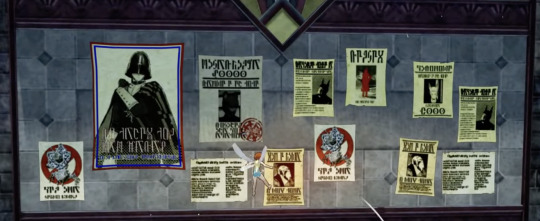
(Screenshot grabbed from justonegamr on Youtube.)
Lots of fun stuff going on with these posters - the big propaganda poster says "Mi volas vin por homoj" - "I want you for humans!" The poster immediately to its right and the one with the light-haired paripus are both wanted posters with rewards of 50,000 and 7,000 respectively, and the former has a somewhat legible name - Mikelan something (?). There's also quite a bit of illegible text that I'll need to boot up the game to stare at, textures willing.
Here is where I noticed an occasional problem with the text in this game: some of these posters include words that should have diacritic marks, but instead the characters are gone entirely or replaced with a space. For instance, the poster with the face that appears twice on the bottom row reads "Ser a peto - i tiu viro" where it should say "Serĉa peto - ĉi tiu viro" (Search request - this man). I spent so long wondering what "Dan ero" meant on the poster with the red "no" sign before I realized it was meant to be "Danĝero" (Danger).
This extends to some other parts of the game, such as the world map title ("Unuiĝinta Reĝlando de Eŭcronio" written as "unui inta re lando de e cronio," which is how I knew it was a plain C oops), and the giant statue in More's study covered in archetype names, some of which are missing characters.
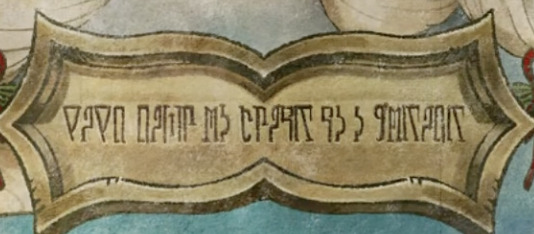
I suspect that at some point in the process, these characters couldn't be properly encoded and got lost before making it into the game. Most of the UI text seems to be intact, and this only affects graphic text as far as I've seen. Luckily, we can usually use context to guess at what they should be.
There's a ton more that I'm still hunting down and translating, so if you'd like to see it, you can check out my spreadsheet here! I'm hoping to keep updating it as I play through the full game, and I may make some more posts if I encounter any particularly interesting details. A few more tidbits before I go:
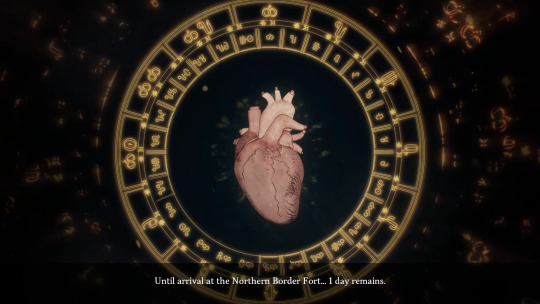
This appears to be an annual calendar - number 1 is at the top and it circles around to 12, and then the inner circle runs from 1-30, likely representing the weeks.
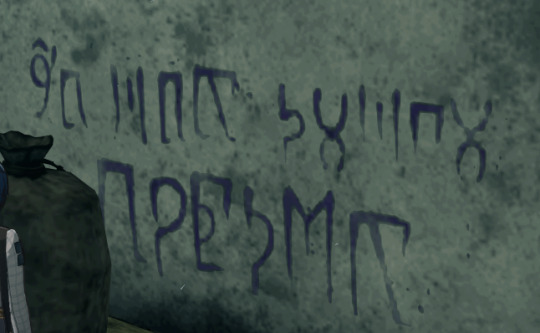
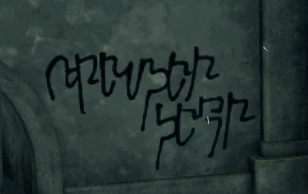
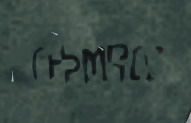
Various graffiti found around Sunshade Row that reads:
Ĉi tio estis infero (this was hell)
Malbela elda (nasty/ugly elda)
Merdo (shit)
And in the words of our favorite tooth...

Elbe venontfoje! (Maybe next time!)
#metaphor#metaphor refantazio#metaphor: refantazio#atlus#atlus games#esperanto#im so deep in the trenches dude i just went around inspecting all the shops and posters around the city#i cant wait to do this in every new location#personal#also i found some very teeny tiny placeholder text in romaji that says something about a hulkenberg image#best of
439 notes
·
View notes
Text
this lightcone powercreep is getting out of hand smh

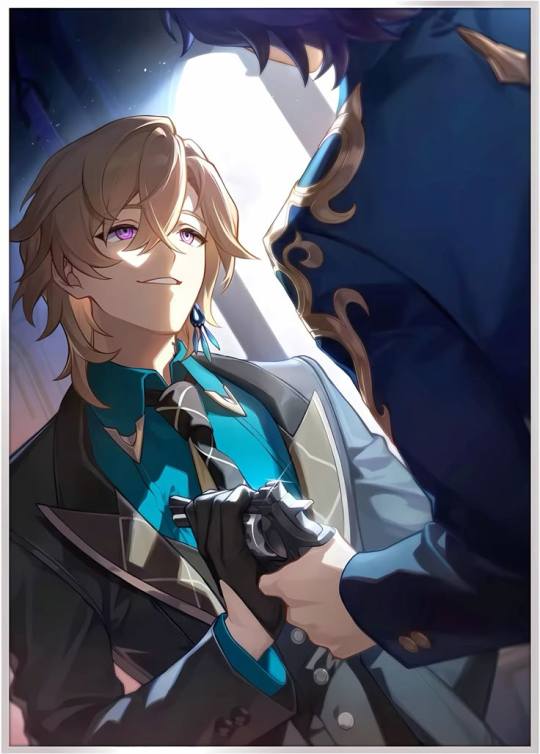
#this is the same image and you cannot convince me otherwise#hoyo loves their blond men and metaphors for penetration#hsr#honkai star rail#phaidei#myphai#ratiorine#aventio#raturine#golden ratio
150 notes
·
View notes
Text
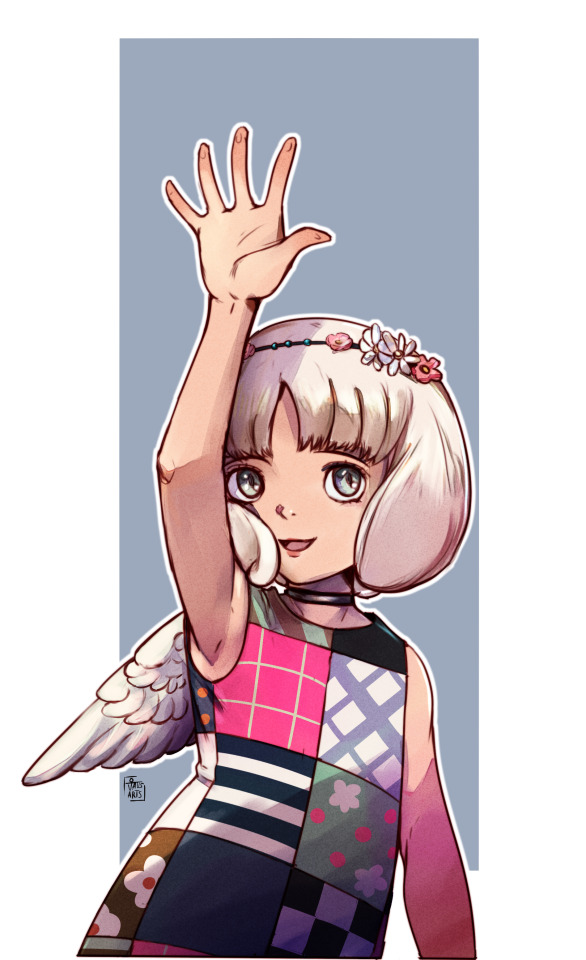
Maria Alces from Metaphor Refantazio
#image description in alt#illustration#digital illustration#my art#fanart#digital art#videogame#metaphor refantazio#maria alces#atlus games#protect her at all costs#Metaphor#Refantazio#Maria Metaphor
124 notes
·
View notes
Text
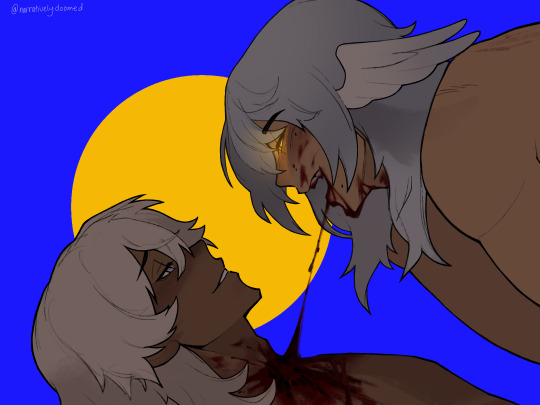
yum!

#tw blood#honkai star rail#hsr#aventurine#sunday#sunturine#avenday#cannibalism as a metaphor for love#could also be interpreted as vampire sunday?#i'm obsessed with them sorry#i hate drawing the halo sorry. just imagine its there in the first image#my art
592 notes
·
View notes
Text

makoto yuki
#fanart#art#persona 3#illustration#persona 3 reload#makoto yuki#minato arisato#persona 3 mc guy whatever .. makoto over minato over roger over#sakuya shiomi#WHO CALLS HIM SAKUYA ?#anyways this post was just me experimenting with stuff#i was inspired by collages and wanted to try to take a stab at it#if you want to try this then my advice is to have a specific theme and build your bases from there..#so what i did was center this piece on the themes of p3 and depression and death and things related to that..#and then I thought of metaphors and images that would go well with the collage..#and i mixed in some real images with redrawn ones#and it wasn’t all planned it was just a process along the way#sorry for this yap session i just wanted to share how fun collages are..
157 notes
·
View notes
Text
Boy, Tolkien really knew how to write water metaphors to capture large movements of people. The Dike at Helm's Deep is boiling with swarming companies of orcs who advance like the tide, flowing forward, being pushed back, and flowing forward again to reach a higher point each time. The riders of Rohan pour slowly but surely onto the Pelennor Fields like rising waters from a breached dam. The leading edge of Éomer's charging cavalry line roars like a breaker foaming toward the shore. It’s all so great.
Not for nothing, but this is another place where PJ really captured something of Tolkien's words in his films through just the visual imagery. There is absolutely something distinctively liquid about the way that Éomer, Gandalf and crew pour over that ridge line and down into Helm’s Deep in Two Towers, and you can totally see the wave-like nature of the cavalry charge outside Minas Tirith later on. It's easy to directly replicate words like dialogue and basic physical characteristics and plot points in an adaptation, but to evoke the same metaphors and capture the implied imagery as well? That's next level.

#lotr#lord of the rings#tolkien#metaphors#so many water images in the tolkien battle scenes#solidiers flowing like the tide and crashing like waves#meta
288 notes
·
View notes
Text
sometimes i am haunted by the imagery of gangle putting on a mask that has a face but no actual holes for the eyes or mouth. that the other side of the mask is completely, utterly blank
#tadc#she can put a new face on but all shes doing is physically covering up the face thats already there#i KNOW this is an obvious detail but smth abt the image.... it feels like visual poetry To Me#i tried to draw smth w it at one pt but i dont remember where i put it. maybe i should try again some day#either way. its hard to even explain what it is abt it that feels so poetic#cus literal mask to symbolize a metaphorical mask ofc. thats straightforward#(fwiw i really enjoy how tadc executes it. its hard to execute smth like that wo it seeming too on the nose but they somehow did it!!)#but. smth abt the mask just having nothing on the other side...#it feels. very potent in a way i struggle to describe#maybe it doesnt matter if i put it into words. maybe the visual speaks for itself...#circus discussion#sorry i feel like this one sounds pretentious HAHA#i jsut. (guy who loves imagery and poetry and symbols and seeing them in art voice) ouhhhhggggggg.... ouhhhh
115 notes
·
View notes
Text
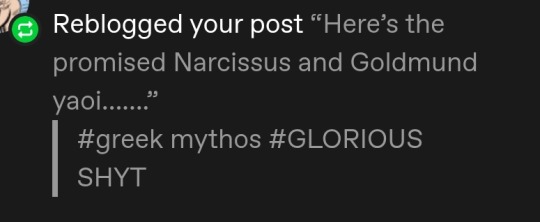
Hesse's naming conventions claims another victim 😔
#I kinda wish Narziss was called something else because a name like this really really really sets Expectations#of the kind that don't necessary fit this character#Even if I love the metaphor of Narziss in love with his mirror image/Goldmund
54 notes
·
View notes